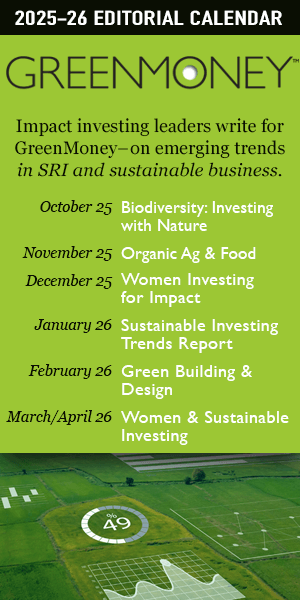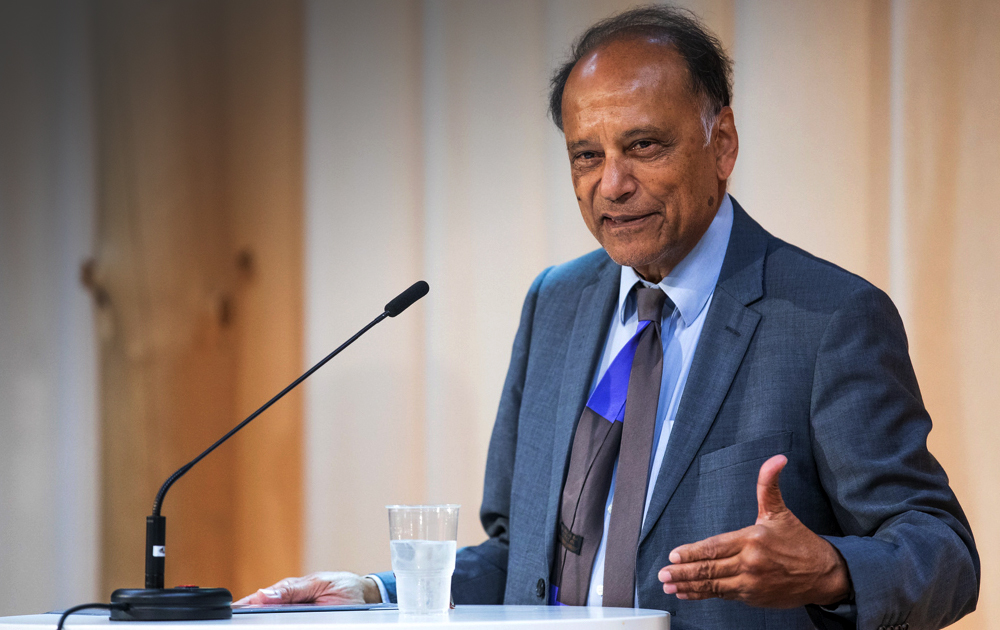 Nina Simons of Bioneers and Everywoman’s Leadership interviews Jessica Houssian of Women Moving Millions
Nina Simons of Bioneers and Everywoman’s Leadership interviews Jessica Houssian of Women Moving Millions
Women in values-based alliances strengthen each other. Having worked with women leaders for over 25 years, I have learned to deeply respect the ability women have – when in intentional, purposeful alignment – to increase each others’ capacities and leverage greater results in collaboration. As a member of Women Donors Network, I have learned so much from fellow members about practicing philanthropy discerningly and skillfully. I’ve also come to appreciate the value of collaborative funding, as it both leverages smaller gifts and increases the knowledge base and engagement level of all participants.
Since I believe that increasing women’s leadership and equity are essential to shifting our human course from its current destructive path, and knowing how underfunded gender equality is, the opportunity to interview Jessica Houssian of Women Moving Millions for this issue felt both timely and relevant.
Women’s equity is an increasingly emergent issue throughout our global system, as more data emerges from every sector, almost daily. Women are at the crossroads of justice, community and ecology, and their equity is essential to shifting our climate and energy systems, as well as co-creating pathways for more just resource distribution, governance and human rights. Studies reveal that more women in decision-making positions produce better (and more profitable) outcomes; that improving the lives, education and self-esteem of women and girls benefits the health, economic development and sustainability of communities; and that more women in positions of authority are essential for working toward world peace. So, whatever your gender, I hope you’ll enjoy learning about this network of women taking a powerful stand on behalf of women and the future of all life on Earth. – Nina Simons
Women Moving Millions (WMM) is a dynamic community of over 230 members all of whom have given $1 Million or more to organizations or initiatives promoting gender equality across the globe. Accounting for initial pledges alone, their members have collectively moved over $500 million in gifts to women and girls. Their mission is to catalyze unprecedented resources toward the advancement of women and girls.
As of 2011, only seven percent of global philanthropic dollars address the needs of women and girls. Investing in women and girls works, but it remains a low priority. WMM members know that empowering women and girls is the key to solving the world’s greatest problems, and that’s why they fund every area of global development from education and health care to environmental health and water issues all with a gender lens in mind.
Nina: Since GreenMoney Journal’s readership is largely financial professionals, how might you describe WMM’s theory of change, vision and values with respect to changing or greening economics, leveraging the network’s financial clout and alternative economic visions?
Jessica: Women currently control an estimated $13.2 trillion of wealth in North America. By 2026, women alone could give an estimated $1 trillion a year if they donated 1.7 percent of their wealth, the lowest percentage of giving from disposable income on record in the last 40 years. This growing global wealth has the potential to transform philanthropic priorities and set new standards of giving.
At WMM, our strategic imperative is to nurture and grow a global community of philanthropists to amplify their individual and collective impact. We know that empowering women and girls works. By supporting women and men who invest in women and girls, we can leverage their financial power and resources to advance gender equality and international development across the globe. Women Moving Millions invests in the women who invest in women and girls.
Nina: What is WMM’s particular strategy or approach to advancing environmental change and social equity?
Jessica: Women Moving Millions’ approach to advancing systemic change in global development is inviting women to be ALL IN FOR HER and give big, be bold, collaborate and apply a gender lens to their work.
We encourage our members to apply a gender lens because we know that culturally entrenched gender norms can affect men, women, girls and boys differently. Gender equality is not just about women’s issues. All areas of international development, whether it is environmental sustainability, water issues, or education, require us to consider how different genders are affected by various problems and solutions.
Nina: How is WMM, as a community or network, altering the landscape of philanthropy? What do you wish more people understood about gender lens philanthropy? (i.e. it’s not about “women’s issues,” but integrating a gender-lens in all areas of your work…?)
Jessica: Women Moving Millions is inviting women – and men – to give bigger and bolder to produce greater impact. This is being done specifically by using a gender lens, which means looking beyond the obvious issues labeled “women and girls” to the broader landscape where gender plays a distinct role. For example, sanitation, at first glance, hardly seems an issue where gender is a factor. But, in fact, most of the water in the developing world is collected by women and girls. That constant and demanding chore often keeps women out of the formal workplace and girls out of school. Even when girls are in school, lack of sanitary facilities such as a latrine may discourage them from staying in school. That’s what using a gender lens can mean.
Nina: There is a lot of talk these days about the power of collaboration in philanthropy. What funding partnerships have occurred through WMM, among members or with organizational partners? Which have worked, and to what do you attribute their success, and which have been challenging, and what have you learned from them?
Jessica: We’ve brought together several successful funding partnerships between members who share similar interests. For example, our Film Circle, composed of members interested in using film as a tool for social change, has funded a number of well-received documentaries: The Hunting Ground, Hot Girls Wanted, and The Mask We Live In.
In terms of organizational partners, our members responded in robust numbers after hearing Molly Melching, Founder & CEO of Tostan, speak at our 2013 Summit on the scourge of female genital mutilation in Senegal. Many members gave financial gifts, while others contributed their time, talent and networks to advance Tostan’s work.
When we’ve tried to impose an agenda or idea related to engagement and leadership of our members, there has been resistance, so we’ve learned that what works the best is when we co-design and create opportunities in partnership with our members, to most effectively meet their needs.
Nina: What trends are you noticing in philanthropy when you look at the WMM community? What are your members most enthused about? (i.e. more interest in gender lens investing, entrepreneurship, whole system thinking, etc.)
Jessica: Our members seem most interested in funding projects that use strategies created with and by the communities that need them. They see the investment in women and girls as a strategy – not a silo’d issue. Also, collaboration – leveraging your philanthropic investment by engaging other individuals, institutional foundations or even governments – is the new norm. That’s why being in a community of peers is so powerful.
Nina: How is WMM leveraging the unique talents and capacities of its network members to affect change? Can you share some of the profiles or demographics of WMM members?
Jessica: Our members serve as role models to inspire other women – and men – to step up, rethink their philanthropic strategy and dare to give at a higher level that has greater impact.
Over 60 percent of our new members join the community through the invitation and inspiration of current members. Often they are drawn because of shared values and vision. For example, we have a number of filmmakers in our community who have graciously shared their skills and knowledge in workshops that have drawn prospective members to join WMM.
All of our members are individuals who represent a wide range of ages, backgrounds and experiences. We have members now from 12 countries and are looking to broaden our global reach.
Biographies:
Born in Vancouver, Jessica Houssian fell in love with feminism as a little girl and has been stomping her feet for women’s equality ever since. With a B.A. in Women & Gender Studies (Bates College) and an M.Sc. in Fundraising & Grantmaking (New York University), Jess loves living and working at the intersection of women and philanthropy – and is inspired by the power it has to transform the world. Prior to her work with Women Moving Millions (www.womenmovingmillions.org), Jess was a partner at Inspired Philanthropy Group – a boutique consulting firm supporting individuals and corporations to help create authentic, effective impact. In another life, Jess served as Associate Features Editor at Harper’s Bazaar magazine, where she learned to write, edit, and treat deadlines with respect. Jess currently serves on the Board of Directors of UNICEF Canada and the Canadian Women’s Foundation, where she Chairs the Anti-Human Trafficking Grants Committee. She serves as Board Chair of RefugePoint, and is a Trustee of The Houssian Foundation.
Nina Simons (www.ninasimons.com) is a social entrepreneur, activist, speaker and writer/producer who is the co-founder of Bioneers (www.bioneers.org) and founder of Everywoman’s Leadership. Bioneers is a nonprofit organization, that identifies, features and promotes innovative leaders with solutions to many of our most pressing environmental and social challenges. Bioneers hosts an annual headwaters conference in California abd partner events across the US, as well as a plethora of inspiring media online. Over the past 15 years, she’s increasingly focused on how leadership itself is being reinvented, and on the leadership of women (and us all) from the heart and feminine. She is the editor of Moonrise: The Power of Women Leading from the Heart, which features essays from diverse women and men that model new forms of leadership from the inside, out. She has been a member of Women Donors Network for 12 years, and co-facilitates Cultivating Women’s Leadership intensives. Previously, in the for-profit sector, she was a Strategic Marketing Director for Odwalla and President of Seeds of Change.

















